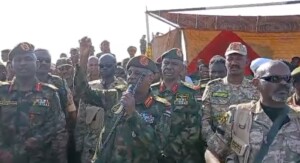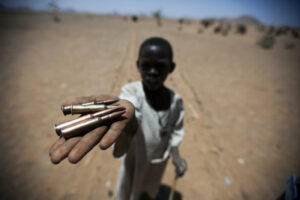Sudan’s Blue Nile state capital ‘completely paralysed’ after Sunday’s violence
Ed Damazin, capital of Blue Nile state, witnessed a relative calm yesterday morning although the situation remained tense and normal life in the town is completely paralysed after shooting continued until late Sunday evening in El Rabee and El Nahda neighbourhoods and inside the city’s Grand Market.
 Thousands of people fled fierce fighting near El Roseires and Ed Damazin in July (social media)
Thousands of people fled fierce fighting near El Roseires and Ed Damazin in July (social media)
Ed Damazin, capital of Blue Nile state, witnessed a relative calm yesterday morning although the situation remained tense and normal life in the town is completely paralysed after shooting continued until late Sunday evening in El Rabee and El Nahda neighbourhoods and inside the city’s Grand Market.
People in Ed Damazin expected a worsening of the situation in the capital after the shooting on Sunday. The residents explained that many are in a state of terror and panic because of these events, which caused many residents to flee their homes.
Ramadan Yasin, Humanitarian Aid Commissioner for the Blue Nile region, said in an interview with the Sudan Today on Radio Dabanga that the markets were “completely paralysed” and that farmers cannot harvest their crops anymore.
As a result of the violence, the Blue Nile State University announced the suspension of studies and exams for an indefinite period of time starting today.
Angry mobs also torched the government secretariat, stormed the 4th Infantry Division and raided the ammunition depot. People also closed the Singa bridge and prevented vehicles from leaving and entering the city. They are demanding the dismissal of Governor Ahmed El Omda after months of resurfacing intercommunal violence.
The violence was described as “systematic killing and a war akin to genocide" by Jamal Nasir, the Minister of Health of Blue Nile state.
'This is systematic killing and a war akin to genocide' – Jamal Nasir
The clashes started in mid-July south of El Roseires when indigenous El Funj, El Hamaj, and in particular Berta tribesmen attacked Hausa families in the area. The violence also flared up in September, when at least 24 people were killed. At least 200 people died so far.
The violence was allegedly triggered by the decision of Malik Agar, member of the Sovereignty Council, to enter Hausa leaders in Blue Nile state into the native administration system in order to gain more support in the region, which he lost by installing relatives from the small Engassana tribe on government posts and in his Sudan People’s Liberation Movement-North (SPLM-N Agar) faction.
Governor El Omda is a nephew of Agar. In end July, a Native Administration leader accused him of colluding with Hausa tribesmen.
Racism
The Hausa in Sudan are part of the Hausa ethnic group, which is very influential in West Africa, politically and culturally. In the process of traveling and trading for centuries, some of them migrated east to places like Sudan – where they, as ‘black Africans’, are still seen by many as outsiders.
Some activists, for example, tweeted that the Hausa demonstrators in other cities marching in solidarity with the Hausa experiencing violence in Blue Nile state did not receive much support.
“It was heart-breaking to watch the Hausa march alone. I expected more people to show up and tell them “you will never walk alone”, “we’re all Hausa” as resistance committees usually do, instead I noticed a lot of hostility and outright racism,” one of them said about a Hausa solidarity protest in Khartoum.
Displacement
The Sudanese Humanitarian Aid Commission reported that at least 13,000 families fled from Wad El Mahi to Ed Damazin and neighbouring El Roseires since Sunday evening because of the violence.
8,000 people fled to Ed Damazin on foot after the renewed clashes in Medina 8 in Geisan on Sunday, according to commissioner Ramadan Yasin.
More than 5,000 people fled to El Roseires, Yasin explained and said that there are still people stranded on the road west of Ed Damazin.
The new displaced are sheltered in a number of schools and Koran schools in various Ed Damazin neighbourhoods, especially in El Gasam neighbourhood. Yasin said that the attacks in Ed Damazin also led to the displacement of people from one neighbourhood to another.
He described the conditions of the displaced as “dire”, appealing to international organisations to provide food and shelter materials.
New commander
The official spokesperson for the Sudan Armed Forces, Col Nabil Abdallah, announced the appointment of a new commander for the Blue Nile Military Region yesterday, Maj Gen Rabee Abdallah Adam.
A fact-finding committee has also been formed that will assess the security situation in the region.











 and then
and then